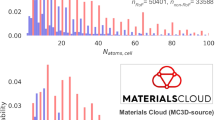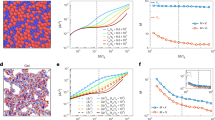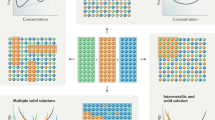Abstract
IN 1951 a communication by me under this title was published in Nature 1. It showed that as Cr2O3 was cooled through the antiferromagnetic transition region, the c-axis (hexagonal setting) contracted sharply, whereas the a axes decreased almost linearly. Recently, R. J. Davis and W. E. Armstrong (private communication), in a study of a system involving Cr2O3, found that, the lattice parameters at room temperature of their Cr2O3 sample did not agree with those given by me. They also suggested that the cause of the disagreement was my indexing the 42&2bar;, 664 rhombohedral reflexion pair as the 42&2bar;, 652 pair. Re-examination of the data and a few additional measurements have shown that this is indeed the case.
This is a preview of subscription content, access via your institution
Access options
Subscribe to this journal
Receive 51 print issues and online access
$199.00 per year
only $3.90 per issue
Buy this article
- Purchase on Springer Link
- Instant access to full article PDF
Prices may be subject to local taxes which are calculated during checkout
Similar content being viewed by others
References
Greenwald, S., Nature, 168, 379 (1951).
Author information
Authors and Affiliations
Rights and permissions
About this article
Cite this article
GREENWALD, S. Changes in Lattice Constant of Cr2O3 near the Curie Temperature. Nature 177, 286–287 (1956). https://doi.org/10.1038/177286a0
Issue Date:
DOI: https://doi.org/10.1038/177286a0
This article is cited by
-
Lattice Magnetostriction in Spinel-Type Iron Chromites
Nature (1956)
Comments
By submitting a comment you agree to abide by our Terms and Community Guidelines. If you find something abusive or that does not comply with our terms or guidelines please flag it as inappropriate.



